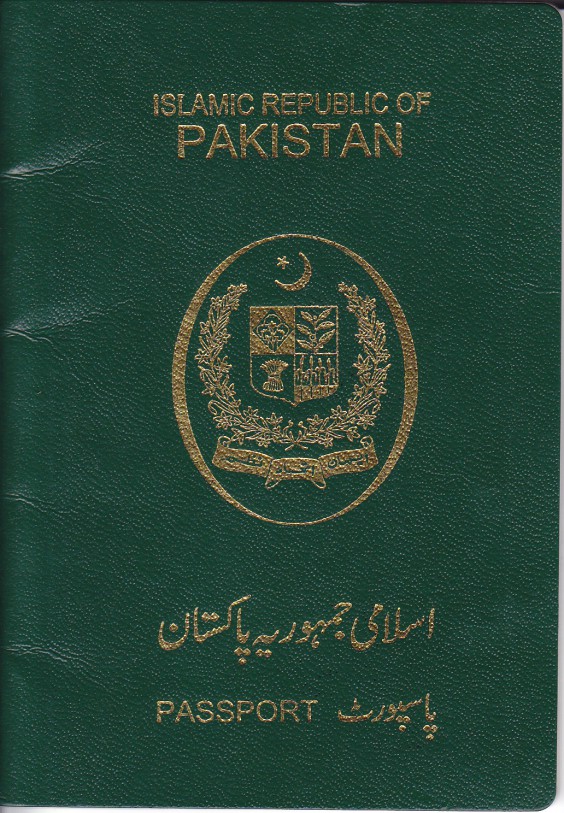Traveling While Pakistani
Securing a mandatory vaccination certificate before going abroad is just one of many restrictions Pakistani travelers face.

Profiling, security checks, and long visa applications all come with holding a Pakistani passport. Photo via: Wikimedia Commons.
Last year, the World Health Organization identified Pakistan as one of the three countries in the world exporting the wild poliovirus, and made recommendations that all Pakistanis be vaccinated before traveling abroad. This threw all Pakistanis with travel plans into a huge panic. While most people asked, “Where can I get vaccinated?” some were more interested in finding out who they had to bribe in order to get a vaccination certificate.

- Pakistan is a country of contradictions – full of promise for growth, modernity and progress, yet shrouded by political, social and cultural issues that undermine its quest for identity and integrity. My bi-monthly column “Pakistan Unveiled” presents stories that showcase the Pakistani struggle for freedom of expression, an end to censorship, and a more open and balanced society.

- Bina Shah is a Karachi-based journalist and fiction writer and has taught writing at the university level. She is the author of four novels and two collections of short stories. She is a columnist for two major English-language newspapers in Pakistan, The Dawn and The Express Tribune, and she has contributed to international newspapers including The Independent, The Guardian, and The International Herald Tribune. She is an alumnus of the International Writers Workshop (IWP 2011).
This may sound like proof of Pakistanis’ endemic addiction to corruption, but it’s more emblematic of the weariness that Pakistanis felt at the idea of one more bureaucratic hurdle in order to travel. Traveling while Pakistan is never simple or easy, as Pakistanis in the post-9/11 world face daunting restrictions on their movements abroad. Some of these are admittedly justifiable; others, not so much. Most of us have learned how to factor these in to our travel plans, adding extra weeks while waiting for a student visa, for example, or routing a trip through a country that doesn’t require a transit visa for a four-hour stay in the airport. And “didn’t get the visa” is a legitimate reason these days for postponing your wedding, not attending university, or losing out on a job opportunity.
It’ll be at least several months until the Pakistani government figures out what it is going to do to reassure the rest of the world that we don’t actually want polio – in addition to jihad, terrorism, illegal immigrants, drugs, human trafficking, and all the other products that Pakistan is traditionally infamous for in the international community – to be on our list of annual exports.
But even if all traces of the poliovirus were to disappear from Pakistan tomorrow, we Pakistanis would still approach levels of near-insanity every time we have to travel abroad. Visa applications are long and complicated, and require extensive documentation in support of the official form. I recently filled out an application for a European country (which will remain unnamed in case they decide to revoke my visa after they read this) for which I needed to spend exactly a week.
I had to provide, in addition to the visa application, copies of all my passports from the last fifteen years; bank statements showing I could support myself during my stay; travel insurance to prove I wouldn’t be a burden on the national health service; verification of employment; confirmation of accommodation and airplane tickets; an invitation letter; a letter from my mother (who I was traveling with) attesting to the fact that she is my mother and I am her daughter; and finally, an affidavit that I would break no laws in the country and return to my home country at the end of my stay.
All of this needed to be provided in triplicate, and each page had to be attested and notarized by a low-level bureaucrat who I suspect made his fortune from stock in the company that makes rubber stamps and notarization stickers. I carried all the documents to the Consulate in a giant shopping bag and promised I would make a bonfire of all the papers and dance around it once it was all over. I only didn’t do this because I felt guilty about all those trees that died in support of my case.
We make a lot of jokes in Pakistan about how the “green passport” gives you very special treatment when you travel abroad. Suddenly, immigration agents sit up and take notice, and ask all sorts of questions about your life, which, taken in the right light, can feel very flattering to the ego. There are the endless hours of entertainment provided when a customs agent insists that you open all your bags to show them everything down to your underwear. And every Pakistani thrills to be pulled out of an immigration line and told they are going to undergo “random security checks.”
Then there are the places in the world that Pakistanis can’t go because of political conflicts that have gone on for longer than much of the population has even been alive. Travel to Israel is out of the question, as the two countries haven’t had diplomatic relations since the founding of both countries in the late 1940s; all Pakistani passports have a stamp that says “Valid For All Countries Of the World Except Israel.” Dr. Iftikhar Salahuddin, a renowned ENT specialist and author of the award-winning book Jerusalem: A Journey Back in Time, is one of the few Pakistanis I know to have traveled to Israel, and from then on to Palestine; he was only able to do so because he holds a US passport. For most of the rest of us in Pakistan, seeing the Holy Land is as yet a dream unable to be fulfilled.
Travel to India, our neighbor, is complex as well: visas come with great difficulty because of security issues, and often a “Police Reporting” visa will be granted (this works both ways, with Indians having the same requirements when they come to Pakistan). In 1988, I went on a high school sports convention to New Delhi; all the Pakistani members of the basketball squad, boys and girls, had to register at the police station every day. I still blame the stress of this experience for us coming in at a pathetic fifth place in the tournament.
Since 9/11, we Pakistanis have been forced to drop any illusions that border control officers can look at us and distinguish an ordinary citizen, traveling for legitimate reasons, from a criminal. There’s no vaccination certificate that can prove honorable intentions, no medical test that will show antibodies for legitimacy in our blood, when the illegal actions of an extremist minority have been extrapolated into the beliefs or characteristics of a law-abiding, moderate majority.
But Pakistanis accept this state of affairs with that peculiar combination of dark humor and resignation illustrative of how we’ve always regarded our situation as symbolic lepers, before the polio crisis turned us into real ones. When I undertook sound research in the form of a Twitter poll, asking random people to tell me what was the worst thing about “traveling while Pakistani,” they all responded, a little too quickly, with the same quip: “Coming back.”





One Comment on "Traveling While Pakistani"
It is indeed really problematic to travel as a Pakistani, be that you are well-educated and refined person. Unfortunately we all painted with one colour.